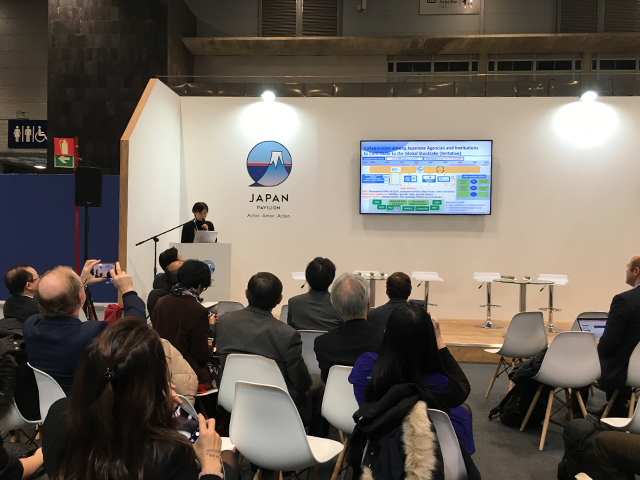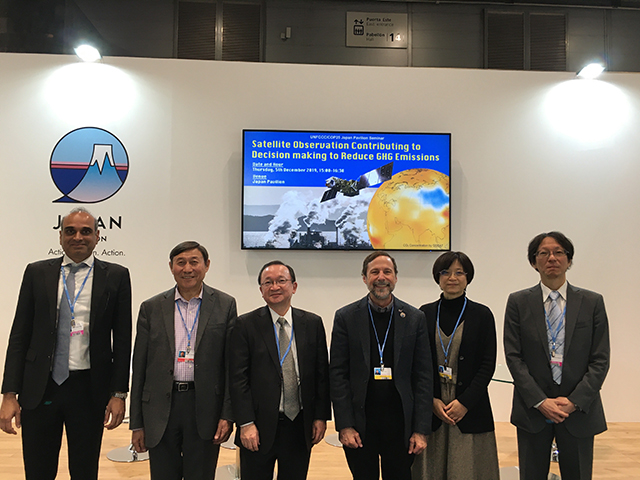Event Schedule - COP25 JAPAN PAVILION
2019.12.05
Satellite Observation Contributing to Decision Making to Reduce GHG Emissions
Organizer
- Japan Aerospace Exploration Agency (JAXA)
Co-Organizer
- Ministry of Education, Culture, Sports, Science and Technology (MEXT)
- Ministry of the Environment (MOE)
- National Institute for Environmental Studies (NIES)
Event Overview
The 2019 Refinement to the 2006 IPCC Guidelines for National Greenhouse Gas Inventories, adopted in May 2019, has now reflected the latest scientific and technical advancement with new additional chapters regarding satellite observation addressing the efficacy of satellites including Greenhouse gases Observing Satellite (GOSAT) launched by Japan in 2009, and no longer considers the technical deficiency of satellite observation as a major problem.
After Paris agreement adopted in 2015, Conference of Parties has begun discussions toward implementation guidelines and the Global Stocktake planned in 2023. Furthermore, following the Global Warming of 1.5°C, an IPCC Special Report on climate change, desertification, land degradation, sustainable land management, food security, and greenhouse gas fluxes in terrestrial ecosystems was published in August of this year. With reference to such discussions, importance of precise estimation of GHG emission and its sources is increasing.
This seminar will begin by introducing the latest activities of GHG observation by satellites and how these satellite data are contributing to the Model analysis. After highlighting the country’s effort and challenge to utilize satellite data to understand the GHG emission, the Japan’s new initiative to develop a GHG analysis platform aiming to support the national, regional and global effort to reduce the GHG emission will be introduced. It will be followed up by discussions on the topics of preparing GHG emission report as well as implementing GHG reduction policy with earth observation data for each country.
Speaker
- Keiko Segawa, Ministry of Environment (MOE), Deputy Director-General
- Prabir Patra, Japan Agency for Marine-Earth Science and Technology (JAMSTEC), Senior Scientist
- Masakatsu Nakajima, Japan Aerospace Exploration Agency (JAXA), Associate Senior Chief Officer of Satellite Applications, Space Technology Directorate I
- David Crisp, National Aeronautics and Space Administration (NASA) / Jet Propulsion Laboratory (JPL), Senior Research Scientist
- Batjargal Zamba, Ministry of Environment and Tourism, Special Envoy of Mongolia on Climate Change
- Nobuko Saigusa, National Institute for Environmental Studies (NIES), Director of Center for Global Environmental Research
- Takeshi Hirabayashi, Japan Aerospace Exploration Agency (JAXA), Director of Satellite Applications and Operations Center, Space Technology Directorate I
Event Materials
Event Summary
This seminar discussed the achievements of atmospheric greenhouse gases (GHG) observation by satellites and expectations, from both satellite data providers and users point of view. As data providers, JAXA and NASA introduced the GHG observation achievements by Greenhouse gases Observing Satellite "Ibuki", and the cooperative observation among national space agencies. Data users, expert of Chemistry Transport Model and experienced researcher of integrating various instruments for GHG observation, introduced the achievements of the improved prediction accuracy by applying satellite data and future research plans. Furthermore, Ministry of Environment and Tourism of Mongolia, which undertakes the development of National GHG Report as well as integration of satellite data of GOSAT for GHG emission reduction policy, expressed expectation towards solving existing issues by satellite observation. At last, "Integrated Observation and Analysis System for Monitoring Anthropogenic and Natural Greenhouse Gas Sources and Sinks" was introduced which is underplanning by Japan to integrate the satellite data, in-site data and models to understand more precise GHG emissions and sinks. In the following panel discussion, there were interventions pointing out the necessity of more precise data to be utilized in the greenhouse gas inventory and importance of the efforts on "Integrated Observation and Analysis System for Monitoring Anthropogenic and Natural Greenhouse Gas Sources and Sinks" towards the Global Stocktake. In addition, awareness on the need of cooperation, especially international cooperation, among data providers, researchers, and inventory developers was shared.
Message and Results
In order to contribute to policy making in regards to GHG emission reduction, JAXA will further foster cooperation among inventory compilers with researchers of both within and outside the country, and plans on providing high-reliability satellite observation data hereafter. Furthermore, in preparation for the first global stocktake on 2023, JAXA will develop satellite GHG observation framework with the cooperation of other domestic institutes and national space agencies.


Other Events On This Day
Towards Enhancing Climate Resilience in the Pacific: Increasing capacity-building opportunities for the private sector
Japan International Cooperation Agency (JICA)
Satellite Observation Contributing to Decision Making to Reduce GHG Emissions
Japan Aerospace Exploration Agency (JAXA)
Accelerating Low-Carbon Technology Transfer through CTCN and GCF
Global Environment Centre Foundation